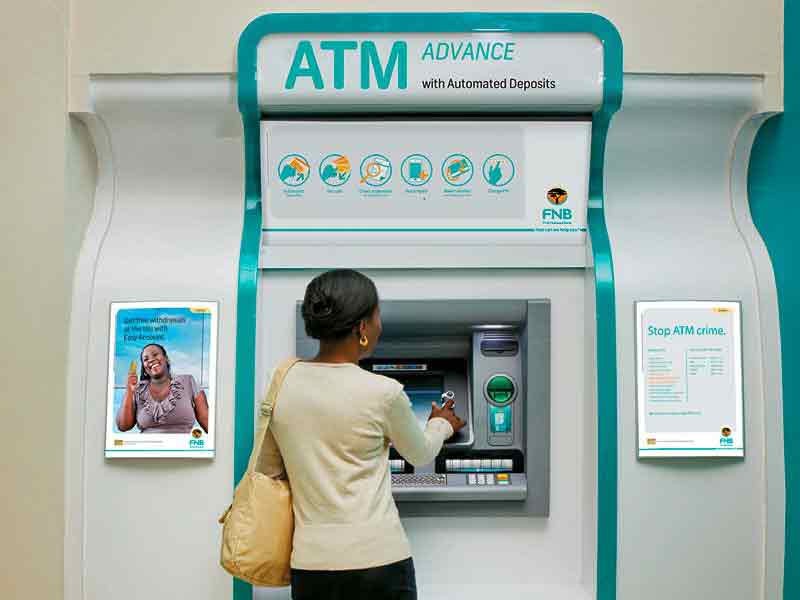- P1.1 billion made from transactional charges
- Bank hikes service fees
- Makes money from swiping charges
- More non-interest services in the offing
- Non-interest charges unregulated
KEABETSWE NEWEL
The behemoth commercial banking outfit, First National Bank Botswana (FNBB), has made a whopping P1.1 billion by charging its customers transactional fees that are termed Non-Interest Income (NII) in banking sector language.
Non-interest income is bank and creditor income derived primarily from fees, including deposit and transaction fees, insufficient funds (NSF) fees, annual fees, monthly account service charges, inactivity fees, check and deposit slip fees, among others. Credit card issuers also charge penalty fees, including late fees and over-the-limit fees.
For the full year ending 30 June 2019, FNBB, under the stewardship of Chief Executive Officer (CEO) Steven Bogatsu, saw its non-interest revenue grow by 7 percent in the year to sit at a cool P1.1 billion. This simply makes FNBB the largest money maker in the field of transactional fees charged on customers. It accounts for more than half of the approximately P2 billion made by commercial banks through bank charges in 2018.
According to Bogatsu, the increase in non-interest income follows a 7 percent increase in his bank’s customer base and a successful roll-out of new products such as the savings pocket. He says improved connectivity of point-of-sale machines and an increase in machines in use, combined with FNBB’s swipe-and-win campaign resulted in an 18 percent growth in card and merchant commissions.
FNBB is also strong in digital transactions – cellphone and Internet banking products for which it heavily charges its customers. Such digital transactional service includes its flagship eWallet, which charges as high as P10-P12 per transaction. Through such innovative products, the bank has also managed to give convenience to its customers, though at a heavy cost.
Most of these products are not much regulated by the Bank of Botswana (BoB) or the Botswana Communications Regulatory Authority (BOCRA), giving banks like FNBB leeway to charge as they please. In a previous engagement, both BoB and BOCRA admitted that neither regulated such transactional fees, with either saying the responsibility fell to the other. It is under this finger pointing that banks like FNBB found leeway to develop products of convenience for Batswana for which it charges the unwary customers.
Through these products, customers can pay bills, buy groceries, send money and conduct almost all transactions at the touch of a button. By these products, commercial banks in Botswana have found a hassle-free way of raising money to augment their interest income. Customers pay as high as P12 to send as little money as P50 while mobile network companies also charge them in terms of airtime needed to conduct such transactions.
Just recently, FNBB hiked its tariffs effective 4 March 2019. The bank announced that it sought regulatory approval from BoB. Further, the adjustment was implemented across FNBB’s various products and services with the aim of encouraging customers to swipe and use digital platforms it provides instead of using cash. The main adjustments were implemented on in-branch services and digital platforms. The in-branch services were slightly increased by 3 percent while certain digital channels were significantly reduced and, in some cases, offered for free to encourage customers to switch to digital platforms and self-service.
The new pricing structure introduced free swipes for personal current accounts to encourage customers to swipe as a safer and cheaper way of transacting, instead of using cash.
FNBB seems hell-bent on investing in such non-interest products, which are evidently its cash-cow. “The bank will continue improving the customer experience through investing both in back-office automation to improve efficiency, and in enhancing its digital channel capabilities to further reduce pressure on branches and ATMs. The bank will continue to assist customers to migrate to digital banking solutions and will also continue to invest in the refurbishment and modernisation of the branch network,” Bogatsu said recently.
Meanwhile, for June 2019, both profit before tax and profit after tax rose by 13 percent due to efficient management of all the key income and expense drivers resulting in an improved return on equity of 22.7 percent (22.1 percent in 2018). Pre-tax profit was P945 million while post tax profit settled at P732 million.
FNBB is the most profitable commercial bank in Botswana. At P7 billion market capitalisation, FNBB is also the most valuable company on the Botswana Stock Exchange (BSE) domestic board.




